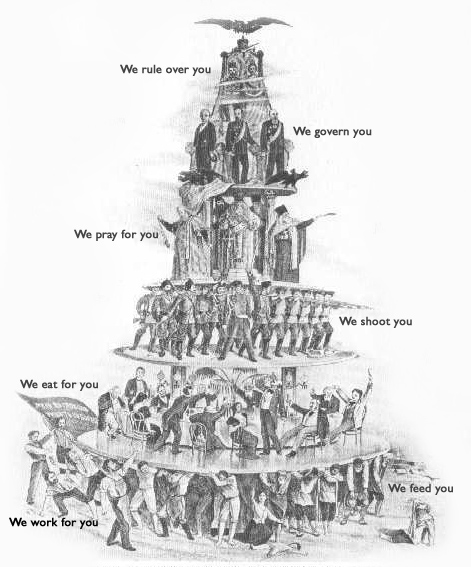Liberty Matters
Of What Use Is Class Analysis?

A social or political class is a mental construct, a categorization of individuals based on common characteristics. As Ludwig von Mises observed in Theory and History:
No logical objection can be advanced against distinguishing various classes among the members of [a] society. Any classification is logically permissible, however arbitrarily the mark of distinction may be chosen.[72]
In his critique of the Marxian theory of class conflict, Mises expressed skepticism about a “doctrine … that deals with classes and not with individuals.” Marx failed to explain “why the individuals give the interests of their class preference over their own interests.” Mises continued:
We may for the moment refrain from asking how the individual learns what the genuine interests of his class are. But even Marx cannot help admitting that a conflict exists between the interests of an individual and those of the class to which he belongs. He distinguishes between those proletarians who are class conscious, i.e., place the concerns of their class before their individual concerns, and those who are not.[73]
The Marxian approach to class analysis—not its content but its very form—generates an insuperable problem for the methodological individualist, for it invests classes per se with an ontological status that no methodological individualist can accept. For Marx, the course of history is determined not by individuals and their subjective values but rather by objective class interests. The distinguished medieval historian Gordon Leff put this problem as follows:
[T]he Marxist view of society … regards class as an actual entity, at once the source of economic, social, legal, institutional and ideological life and the agent in their development. It therefore endows class both with ontological and empirical meaning; it is the underlying reality of which all societal forms are an expression, and … class provides the dynamics for all change…. What men think—as what they do—is subsumed under the interests of the class to which they belong. Paradoxically we are here nearer to a form of Platonism or medieval realism than to materialism; for although the material conditions are made the determining factors they are conceived not in terms of actual individuals but as self-subsistent natures or essences or wholes, which are autonomous of the individuals which comprise them. Like the realist the Marxist assigns an ontological priority to the whole over the individuals which are subsumed under it; they are what they are in virtue of their participation in the whole: just as an individual Smith or Jones is a human being through having the nature man, so Marxist man is a capitalist or a proletarian through bearing the characteristics of his class; they are no less part of his social nature than to be able to talk or think is part of his human nature.[74]
Given the radical difference between the Marxian approach to class analysis and that available to methodological individualists, and given that classical liberals (and libertarians) have typically been methodological individualists, we may reasonably ask: Of what value is class analysis to classical liberals? Does class analysis contribute anything substantial to the liberal view of sociology and history?
I am frankly uncertain about this matter. The significance of class analysis for classical liberals must lie in the crucial distinction between persuasion and coercion as alternative methods of dealing with others. John Milton put the matter concisely in 1644: “[H]ere the great art lies, to discern in what the law is to bid restraint and punishment, and in what things persuasion only is to work.”[75] The traditional classical-liberal suspicion of the state was rooted in the fact that states characteristically employ coercion, in contrast to voluntary persuasion. In his classic account, Franz Oppenheimer called these the political and economic means of acquiring wealth. This led Oppenheimer to define the state as “an organization of the political means.”[76]
If there is an objective foundation for class analysis in libertarian ideology, this is surely it. Yet, as David Hart remarked in his initial article, the modern state is so enmeshed in social activities that it is problematic to regard every person who is paid by government as members of the ruling class. Is the public-school teacher a member of the ruling class, whatever his or her political views may be? To claim this would be stretching the point, to say the least.
It seems to me that the value of class analysis lies in the convergence of interests among those who seek to expand the power of government. This class includes not only those who work for the state at high levels of decision-making but also those citizens in a democratic society who, through voting, actively support the expansion of government. To call such people a “class” may serve some purpose—but this is a limited purpose indeed, especially when compared to the Marxian approach.
Endnotes
[72.] Ludwig von Mises, Theory and History: An Interpretation of Social and Economic Evolution (1957; New Rochelle, NY: Arlington House, 1969), p. 113.
[73.] Ibid., pp. 112-13.
[74.] Gordon Leff, History and Social Theory (University, AL: University of Alabama Press, 1969), pp. 170-71.
[75.] John Milton, Areopagitica, in The Student’s Milton, ed. Frank A. Patterson (New York: F.S. Crofts & Co., 1946), p. 741.
[76.] Franz Oppenheimer, The State, trans. John Gitterman (San Francisco: Fox and Wilkes, 1995 [1914]), p. 15.
Copyright and Fair Use Statement
“Liberty Matters” is the copyright of Liberty Fund, Inc. This material is put on line to further the educational goals of Liberty Fund, Inc. These essays and responses may be quoted and otherwise used under “fair use” provisions for educational and academic purposes. To reprint these essays in course booklets requires the prior permission of Liberty Fund, Inc. Please contact oll@libertyfund.org if you have any questions.